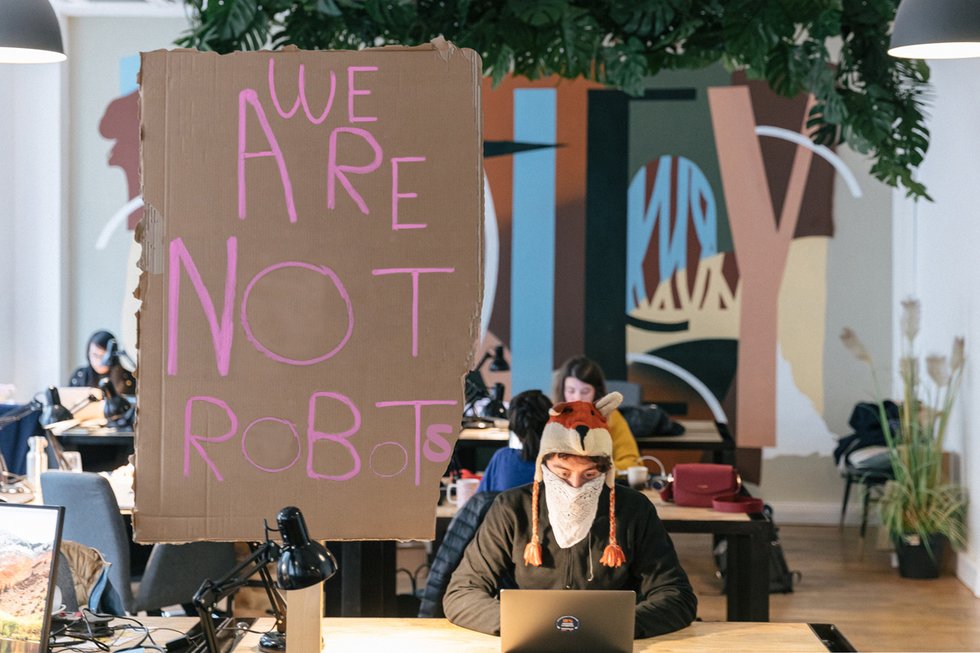Taking on tyrants: UK tech workers unionise for better rights for all
09 déc. 2020
7min


Journalist & documentary filmmaker
For many, unions are a thing of the past. In the UK, they evoke the miners’ strikes of the 1970s and 1980s—and Margaret Thatcher’s role in squashing them—more than the tech industry. The tech industry is usually more associated with digital nomads, ping-pong tables, and free lunches than picketing and protests.
Tech is one of the fastest growing sectors in the UK—official data shows it grew six times faster than the economy as a whole in 2018—and high salaries make tech workers among the UK’s top earners. If you look at the stats, it’s easy to be skeptical about the idea of tech workers getting together to fight for better working conditions. So why is it that some workers in the sector, from UX designers and product managers to developers and software engineers, have decided to form a union?
What is UTAW?
The United Tech and Allied Workers Union (UTAW) is the first union dedicated to tech workers in the UK. It launched in September 2020 and is part of the Communication Workers Union (CWU), a larger, more established organization. The seed for this syndicate was planted in late 2019 by a couple of tech workers who met via the London Tech Workers Coalition, blissfully unaware of the global health crisis that was about to unfold.
UTAW isn’t the first attempt in the world at unionizing the sector. According to Dr. Jamie Woodcock, a London-based academic who specializes in work and the gig economy, tech workers organized a strike at the Japanese company Fujitsu in 2009. Berlin Tech Workers Coalition organizes events to bring together and educate tech workers on their rights. Campaign to Organize Digital Employees (CODE-CWA) is the tech workers’ branch of The Communications Workers of America (CWA).
But apart from a few other strikes in the past years, the UK tech industry has had a rather smooth ride.
Why now?
Unsurprisingly, Covid has a lot to do with the creation of UTAW. Some tech companies are clearly profiting from the pandemic: everyone is at home relying on technology to do pretty much everything, from working and shopping to working out and socializing. Take Amazon, where net sales grew 37% in Q3 year on year. In this unprecedented crisis, tech workers are becoming aware of the importance of their jobs—and of their precariousness.
As working from home becomes increasingly common, the job market is changing. Tech employers can feasibly employ staff anywhere in the world. Wendy Liu, a start-up founder and author of Abolish Silicon Valley, says that tech workers who are highly valued in the marketplace are starting to see that this is not going to last forever. “Power is nice when you have it, but it’s fickle,” she said. “It’s not about you and how good you are as a worker. It’s about financial trends that you don’t have any power over. You don’t have control over venture capitalists.”
For Dr. Woodcock, the challenges of Covid present a historic moment. “Covid has shown to many workers that their employers are not going to support people through a pandemic,” he said. “And that they should have started organizing sooner.”
Why tech workers?
There are many reasons pushing tech workers together, especially at this moment in time.
Not all tech is good tech
Tech workers are realizing the power they hold, with many working for hugely influential companies such as Facebook, Google, Apple, and Microsoft. By designing software that shapes lives globally, these tech experts hold crucial information about their employers; and at times, dirty secrets that could bring them down.
Documentaries such as ‘The Great Hack’ and ‘The Social Dilemma’ show the dark side of tech and how powerful tech companies are making their own laws. Governments have failed to hold these tech companies to account, which means that collective employee action seems one of the most direct ways to have an impact.
Dr. Woodcock agrees that this strategy is one of the most efficient. “These technologies are not abstract things, they are made by people,” he said. “If people who make them can refuse to take part in certain projects because they think tech should be used for more progressive ends, we can start to imagine a different kind of use of technology. This has a huge potential power beyond their workplaces.”
Solidarity with other workers in tech
Unionized tech workers are well aware of their privilege and their value in the economy—for now. So what do they get from a union? John, a co-founder of UTAW, says that most people join the tech union because they want to use their power to support other, less privileged workers.
Kara, a software engineer in Scotland, is another UTAW co-founder. The 28-year-old explains that the union is trying to raise awareness of the importance of other roles in the tech ecosystem. “Customer service teams are heavily feminized,” she said. “I myself am a software engineer, but I know if I break something, this other group of customer support will have to deal with my mistake. I would love these support roles to be seen as important.”
UTAW demonstrated this solidarity recently when members protested alongside Facebook cleaners in London against their allegedly unfair redundancies. “Sometimes all it takes is a few tech workers to take a stand,” said John. “When employers start seeing these acts of solidarity coming from high-leverage workers, the effect it has is enormous.”
Job protection
The feeling that the tech industry boom might come to a halt is palpable. The last decade, with two recessions and a pandemic, has a lot to do with this.
Duncan is a 27-year-old software support worker employed by a big tech company in the UK. He doesn’t have any pressing issues regarding his employer but he wants to make sure that he protects what he has.
“I’m fairly well paid but I don’t know why really,” he said. “It seems to be because there is a skills shortage, but that could very soon change.”
Duncan believes anyone could be a programmer with the right training. “That’s a good thing, and the industry should open more doors,” he said. “But once there are many more tech workers, employers can start exploiting us more and erode our working conditions.”
Having tech workers’ backs
Another assumption about the tech industry is that it’s beyond workplace conflicts. For John, the problems encountered in tech are as acute as anywhere else. “We have bullying, discrimination, gender pay gap, lack of representation, scandals, cronyism…” he said. From employee surveillance and racism to misuse of performance improvement plans (PIPs) and crunch culture, the list goes on.
Unions are there to remind workers of their rights, and support employees who might have a specific issue at work, from dealing with a redundancy to negotiating a better payout. Union representatives can also sit in on meetings.
“We’ve had our members accompanied by a trade union representative who has got their back, and suddenly that balance of power starts to change,” said John. “It’s not three management people eroding an employee on a Zoom call, it’s a very different discussion. The company starts to tread very carefully when they realize they are being watched.”
Duncan joined UTAW because he felt strongly about the increased surveillance of workers. “I work better if I can go at my own pace and feel like I’m not being watched,” he said. “In this pandemic we’re all working from home really and having that amount of surveillance in your own home feels a bit creepy. I don’t want employers to have that amount of power on me.”
What challenges does UTAW face?
Membership is increasing at UTAW, but the organization faces some challenges.
- Fighting an anti-union stance
Unions aren’t popular in the tech industry, according to Dr. Woodcock. “When unions haven’t been present for a very long time, managers are hostile towards them,” he said. “In Silicon Valley there are partially substantiated rumors about union blacklists, and companies that offer anti-union services. It’s an unfriendly terrain to organize on.”
- Losing the class narrative
For Oliver, a university researcher moving into tech, UTAW might face issues breaking into larger organizations such as Microsoft and Amazon. “There’s a class narrative about trade unions being for certain people,” he said. “That’s one of the hard things to overcome, particularly in the UK, where trade unionism has crumbled since Margaret Thatcher.”
This is why the final step in this form of workplace activism—official recognition of UTAW branches within companies—might be tough.
- Protecting anonymity
Oliver explains that union members don’t have to tell anyone they’ve joined. “There are people who are anxious about their employers knowing, but we protect people’s confidentiality,” he said. “It’s about helping people understand how they can spread the message in their own organizations in a way that keeps them safe.”
- Expanding membership
UTAW will have to expand outside of its own echo chamber of left-leaning tech workers. It will need to convince a wider audience to become a sustainable work organization. “We need to expand our membership, and enable these new members to take some responsibility,” said Kara. “The committee provides steering but they are not doing all the work. This would lead to burnout and exhaustion.”
A change in attitude
One of the positive and surprising elements of this new union is the younger demographic it has attracted. John used to be the youngest at union conferences, alongside people in their 50s and 60s. “Now, at 35, I’m suddenly the oldest, and it’s great!” he said. “What has brought most people to UTAW is the success of single-issue grassroots groups that organize collective actions.” He cites groups such as Amazon Employees For Climate Justice, Microsoft Workers for Good, and No Tech For Tyrants, which have inspired workers in the UK to take a serious look at unionizing the tech sector.
So what’s next for UTAW? For Duncan, this new tech union has to prove its value by making an impact in the workplace. “It’s got to start organizing in a workplace or two, to prove that by collective action these workers can get a better deal.”
According to Oliver, managers and CEOs should welcome UTAW, not be threatened by it. “This is about protecting tech workers, and making them happier, better paid, more secure in their jobs. If the workers are happy, then they are doing good work,” he said. “This is about culture change for the sector that is good for everybody.”
Photo: Welcome to the Jungle
Follow Welcome to the Jungle on Facebook, LinkedIn, and Instagram, and subscribe to our newsletter to get our latest articles every day!

Inspirez-vous davantage sur : Les tendances du monde du travail

Workplace influencers: How employee-generated content is changing the game
Who says becoming an influencer means quitting your day job?
05 déc. 2024

The rise of homeless workers: A hidden crisis fueled by soaring costs
The rising cost of living is putting individuals on the brink of homelessness, even those with full-time jobs ...
21 nov. 2024

The emotional toll of quitting in Japan—and the role of professional quitters
In Japan, quitting a job transcends professional boundaries, often becoming a deeply emotional and cultural challenge.
20 nov. 2024

RTO or risk: Are return-to-office mandates harming company culture?
Flexible work policies have become a core expectation for employees and workers are viewing RTO mandates as restrictive.
30 oct. 2024

Why are workers quitting after getting promoted?
29% of promoted employees quit within six months of their promotion—but why?
13 mars 2024
La newsletter qui fait le taf
Envie de ne louper aucun de nos articles ? Une fois par semaine, des histoires, des jobs et des conseils dans votre boite mail.

Vous êtes à la recherche d’une nouvelle opportunité ?
Plus de 200 000 candidats ont trouvé un emploi sur Welcome to the Jungle.
Explorer les jobs